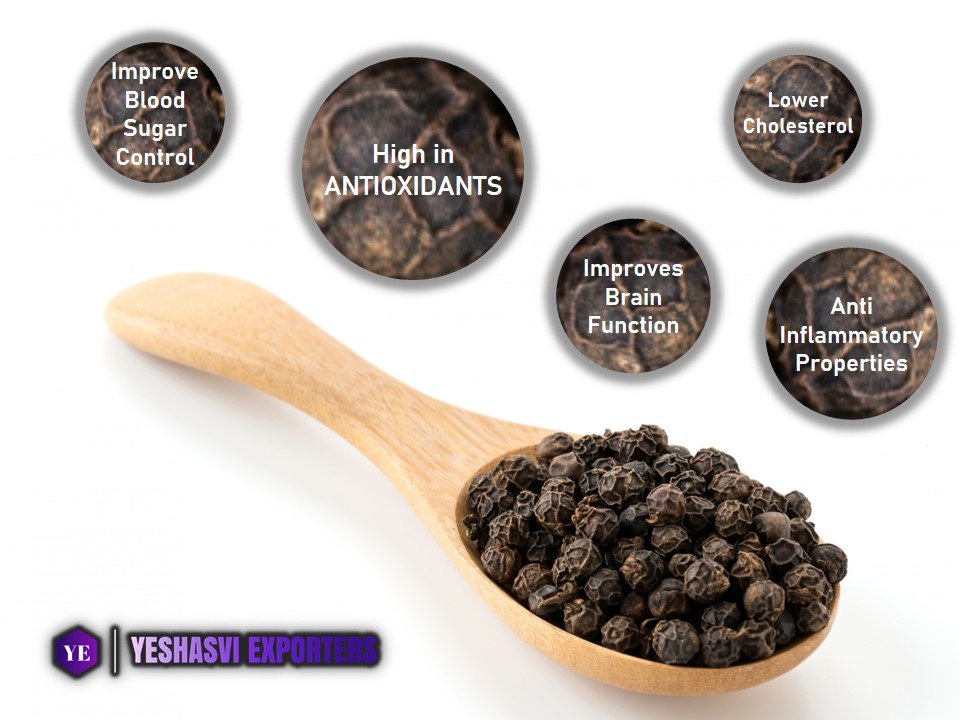Black pepper
Black pepper is a common flavoring and cooking ingredient that is prized for its acrid and somewhat spicy flavor. It is manufactured from the dried fruit of the pepper plant, which is indigenous to India and is grown in other tropical areas all over the world.
A common ingredient in many dishes, black pepper has been utilized for ages in different cuisines all over the world. The dried peppercorns are used to mill it in both its full form and a powdered form. Including soups, sauces, marinades, rubs, and other foods, it is used to enhance flavor and aroma in a range of dishes. On the table, it is frequently used as a condiment to season meals to taste.

Why black pepper is good for you?
Due to its natural constituents and antioxidant capabilities, black pepper has been linked to a number of potential health advantages. Black pepper may be beneficial to you for a number of reasons, including:
Natural substances like piperine, which has antioxidant effects, are found in black pepper. Free radicals can injure cells and lead to a number of health problems, including chronic illnesses like cancer, cardiovascular disorders, and neurological diseases. Antioxidants aid in the body's attempt to combat these dangerous free radicals.
Benefits for the digestive system: Black pepper has long been utilized as a digestive aid in Ayurvedic medicine. It is thought to enhance healthy gut function and encourage the synthesis of digestive enzymes, which can help with digestion. It may also have modest laxative properties that promote regular bowel movements.

Potentially reducing inflammation: Piperine, a substance present in black pepper, has been demonstrated to have anti-inflammatory effects. The body's normal response to injury or illness is inflammation, but persistent inflammation can lead to a number of health problems. Black pepper has anti-inflammatory properties that may help lessen inflammation in the body and may be beneficial for illnesses like arthritis that are worse by inflammation.
Black pepper has been found to increase the bioavailability and absorption of several minerals, including curcumin, the active ingredient in turmeric. When combined with black pepper, piperine in black pepper can aid in enhancing the body's absorption of curcumin, potentially enhancing the health advantages of turmeric.
Black pepper possesses antibacterial characteristics that have been demonstrated against specific types of bacteria and fungi, which may aid in preventing the growth of hazardous pathogens.
The only real distinction between black pepper and black pepper that has been ground up is how it looks.
When referring to black pepper, the term "black pepper" refers to the dried fruit of the pepper plant (Piper nigrum), which is taken when the berries are still green and then left to dry. Often offered whole, these dried berries—also known as peppercorns—can be utilized in a variety of culinary preparations.
Contrarily, ground black pepper is just black pepper that has been pulverized or ground into a fine powder. It is a convenient type of black pepper that is widely used in cooking and flavoring and is easily found in most grocery stores.
Black pepper uses:
Black pepper is a versatile spice that has much use in cooking and outside of it. Black pepper has a variety of purposes, such as:
Black pepper is a common spice used to season meals in the kitchen. It can be added to a variety of recipes, such as soups, sauces, stews, marinades, dressings, and more, to provide food flavor and a bit of heat.Ground black pepper is frequently used as a table condiment to lend a flavorful kick to finished dishes including salads, roasted vegetables, grilled meats, and more.
Whole black peppercorns are frequently used in a grinder or pepper mill to freshly grind pepper, which can produce a more potent and flavorful Whole black peppercorns are frequently used in a grinder or pepper mill to freshly grind pepper, which can produce a flavor that is richer and more aromatic than pre-ground pepper.
Blends of spices: Curry powder, garam masala, and Chinese five-spice powder, among others, all contain black pepper as a common ingredient.
Pickling: To give pickled vegetables or fruits flavor and a sense of heat, whole black peppercorns are occasionally added to pickling brines.
Drinks: Black pepper can be used to provide a distinctive flavor profile in a variety of drinks, including spiced teas, mulled wines, and even some cocktails.
Home remedies: Due to the potential health benefits of black pepper, it has been employed in traditional medicine. It's been applied at home among other purposes, in homemade treatments for stomach problems, coughs, and sore throats. It's crucial to remember, though, that if you plan to use black pepper as medicine, a trained healthcare expert should be consulted first.
Skincare: Due to its potential antioxidant and antibacterial characteristics, which may support healthy skin, black pepper extract or essential oil is occasionally utilized in skincare products.

Black pepper importing from India is best for you!
A company that deals with the import and sale of spices may benefit in a number of ways from importing black pepper from India. Here are a few of the main advantages:
Black pepper of the highest quality: India is one of the world's top producers and exporters of black pepper, which is renowned for its flavor and excellent quality. Indian black pepper is renowned for its strong flavor, which may help a company stand out in the marketplace and develop a devoted clientele.
Cost-efficient: India is renowned for manufacturing premium black pepper at reasonable costs. A company may retain its profit margins and keep its product pricing competitive by importing black pepper from India.
Availability all year round: Since black pepper is grown all year long in India, a company that imports black pepper from India may have a reliable supply of black pepper all year long. Even in the off-season, when black pepper is not readily accessible in other areas of the world, this can assist fulfil the need for black pepper.
Supply chain diversification: By importing black pepper from India, a company can lessen the risk of supply chain disruptions brought on by unforeseen events in other nations where they typically source black pepper, such as natural disasters, political unrest, or other unforeseen occurrences.
Historically, black pepper has been employed for its therapeutic properties and is a staple in Indian cuisine.